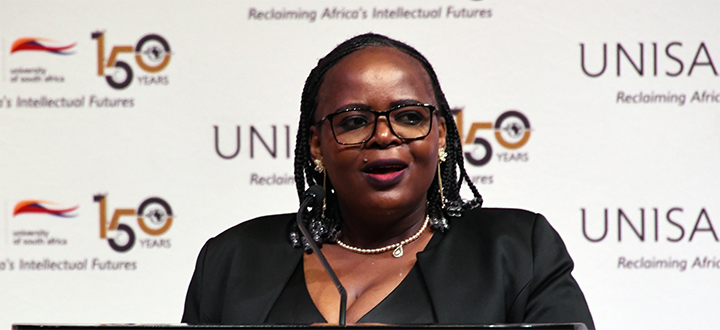College of College of Graduate Studies
Optimising postgrad research publications
The amended "Procedures for Master’s and Doctoral (M&D) Degrees" shows a publication requirement for M&D degrees as part of the examination process. In response, the School of Interdisciplinary Research and Graduate Studies in the College of Graduate Studies has hosted several supervision capacity workshops on research publications to address the amendment.

Dr Nozipho Gumbi
Dr Nozipho Gumbi, a researcher at the Institute for Nanotechnology and Water Sustainability, in the College of Science, Engineering and Technology, recently facilitated a workshop to promote the notion of publication with postgraduate students.
She unpacked section 2.6 of the "Procedures for Master's and Doctoral Degrees", where master's and doctoral candidates are required to submit one or more manuscripts for publication to a peer-reviewed accredited journal as part of the thesis or dissertation phase. Gumbi aligned this amendment to the NDP 2030, in which it is stated that South Africa needs to increase the production of PhD graduates, from 28 graduates per million, per year, to 100 graduates per million per year, in other words, a target of approximatively 6 000 PhD graduates per year by 2030.
Gumbi also showed the benefits of publishing while being a student, which includes the following:
- The thesis or dissertation would have already undergone a peer review process.
- It increases the chances of securing funding and post-doctoral opportunities.
- It adds to research outputs.
Publishing from research projects

Prof Jimi Adesina
In a further workshop in the series, Prof Jimi Adesina, incumbent of the DSI/NRF SARChI Chair in the Social Policy in Africa, continued on the topic of maximising research publications. Adesina encouraged attendees to publish journal articles from their academic projects. He said supervisors need to assist students to prepare their theses, with producing a publication in mind, at the conceptualisation stages. He emphasised the importance of publishing from research projects and explored publication options, for instance, converting a thesis into a book that is suitable for the social sciences and humanities.
Adesina further elaborated on the subsidy implications and provided guidelines on extracting articles from thesis chapters, including the transition from thesis chapters to journal articles. This involves a brief identification of the problem (identifying the lacuna in knowledge), a brief statement on the research methods, an extended discussion of the substantive findings and setting out the importance of your findings (contribution to knowledge). He said this is the opposite of the "omnibus" format of the thesis, which has a linear structure, that is, "Problem -> Research -> Data Presentation -> Discussion of Findings", which is not likely to work for publications.
Gumbi and Adesina both emphasised the importance of identifying appropriate journals, because not all journals in the same knowledge field may be suitable for publishing the focus areas in the thesis. They advised M&D students to spend time on investigating suitable journals as well as their reputation. They cautioned that cutting corners in this regard will always lead to regret, especially in instances where journals are found to be predatory or it is established that a journal is not on the Department of Higher Education and Training’s list of accredited journals.
The last theme in this series will be on familiarising students with the PhD oral defence.
* By Tonny Matjila, Research Training & Development Officer, College of Graduate Studies
** Teaser image: Alpha Stock Images
Publish date: 2021-11-03 00:00:00.0


 Mental health among men in the workplace needs more attention
Mental health among men in the workplace needs more attention
 "I owe everything to Unisa and my late supervisor's priceless mentoring"
"I owe everything to Unisa and my late supervisor's priceless mentoring"
 Majikijela - a queer scholar raising homosexuality awareness through his work
Majikijela - a queer scholar raising homosexuality awareness through his work
 Unisa and Inqaba Biotec unveil groundbreaking DNA research platform
Unisa and Inqaba Biotec unveil groundbreaking DNA research platform
 College of Law appoints esteemed scholar as executive dean
College of Law appoints esteemed scholar as executive dean